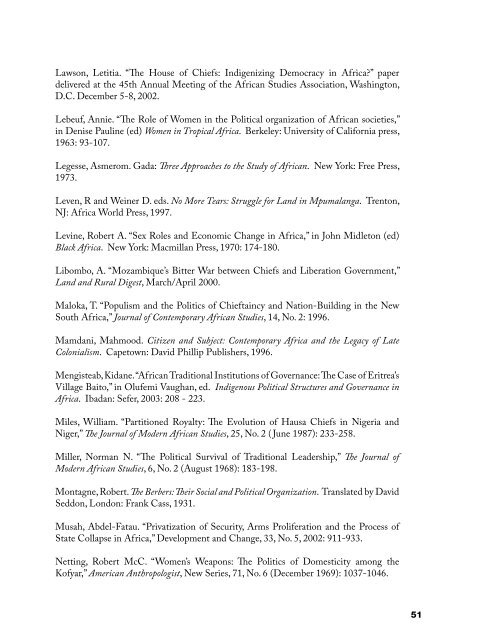Relevance of - United Nations Economic Commission for Africa
Relevance of - United Nations Economic Commission for Africa
Relevance of - United Nations Economic Commission for Africa
You also want an ePaper? Increase the reach of your titles
YUMPU automatically turns print PDFs into web optimized ePapers that Google loves.
Lawson, Letitia. “The House <strong>of</strong> Chiefs: Indigenizing Democracy in <strong>Africa</strong>?” paper<br />
delivered at the 45th Annual Meeting <strong>of</strong> the <strong>Africa</strong>n Studies Association, Washington,<br />
D.C. December 5-8, 2002.<br />
Lebeuf, Annie. “The Role <strong>of</strong> Women in the Political organization <strong>of</strong> <strong>Africa</strong>n societies,”<br />
in Denise Pauline (ed) Women in Tropical <strong>Africa</strong>. Berkeley: University <strong>of</strong> Cali<strong>for</strong>nia press,<br />
1963: 93-107.<br />
Legesse, Asmerom. Gada: Three Approaches to the Study <strong>of</strong> <strong>Africa</strong>n. New York: Free Press,<br />
1973.<br />
Leven, R and Weiner D. eds. No More Tears: Struggle <strong>for</strong> Land in Mpumalanga. Trenton,<br />
NJ: <strong>Africa</strong> World Press, 1997.<br />
Levine, Robert A. “Sex Roles and <strong>Economic</strong> Change in <strong>Africa</strong>,” in John Midleton (ed)<br />
Black <strong>Africa</strong>. New York: Macmillan Press, 1970: 174-180.<br />
Libombo, A. “Mozambique’s Bitter War between Chiefs and Liberation Government,”<br />
Land and Rural Digest, March/April 2000.<br />
Maloka, T. “Populism and the Politics <strong>of</strong> Chieftaincy and Nation-Building in the New<br />
South <strong>Africa</strong>,” Journal <strong>of</strong> Contemporary <strong>Africa</strong>n Studies, 14, No. 2: 1996.<br />
Mamdani, Mahmood. Citizen and Subject: Contemporary <strong>Africa</strong> and the Legacy <strong>of</strong> Late<br />
Colonialism. Capetown: David Phillip Publishers, 1996.<br />
Mengisteab, Kidane. “<strong>Africa</strong>n Traditional Institutions <strong>of</strong> Governance: The Case <strong>of</strong> Eritrea’s<br />
Village Baito,” in Olufemi Vaughan, ed. Indigenous Political Structures and Governance in<br />
<strong>Africa</strong>. Ibadan: Sefer, 2003: 208 - 223.<br />
Miles, William. “Partitioned Royalty: The Evolution <strong>of</strong> Hausa Chiefs in Nigeria and<br />
Niger,” The Journal <strong>of</strong> Modern <strong>Africa</strong>n Studies, 25, No. 2 ( June 1987): 233-258.<br />
Miller, Norman N. “The Political Survival <strong>of</strong> Traditional Leadership,” The Journal <strong>of</strong><br />
Modern <strong>Africa</strong>n Studies, 6, No. 2 (August 1968): 183-198.<br />
Montagne, Robert. The Berbers: Their Social and Political Organization. Translated by David<br />
Seddon, London: Frank Cass, 1931.<br />
Musah, Abdel-Fatau. “Privatization <strong>of</strong> Security, Arms Proliferation and the Process <strong>of</strong><br />
State Collapse in <strong>Africa</strong>,” Development and Change, 33, No. 5, 2002: 911-933.<br />
Netting, Robert McC. “Women’s Weapons: The Politics <strong>of</strong> Domesticity among the<br />
K<strong>of</strong>yar,” American Anthropologist, New Series, 71, No. 6 (December 1969): 1037-1046.<br />
51
















